The question of Taiwan in the context of East Asian affairs
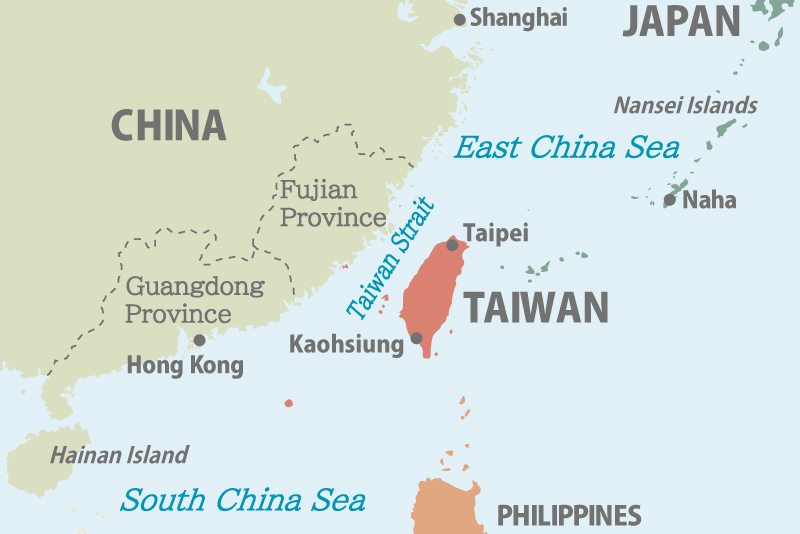
The status of Taiwan’s position in East Asia has been the focus of much attention. Professor Yasuhiro Matsuda of the University of Tokyo’s Institute for Advanced Studies on Asia discusses the nature of the relationship between Taiwan and China, how that relationship has resulted in the current tensions over the Taiwan Strait, and where Japan comes into play.
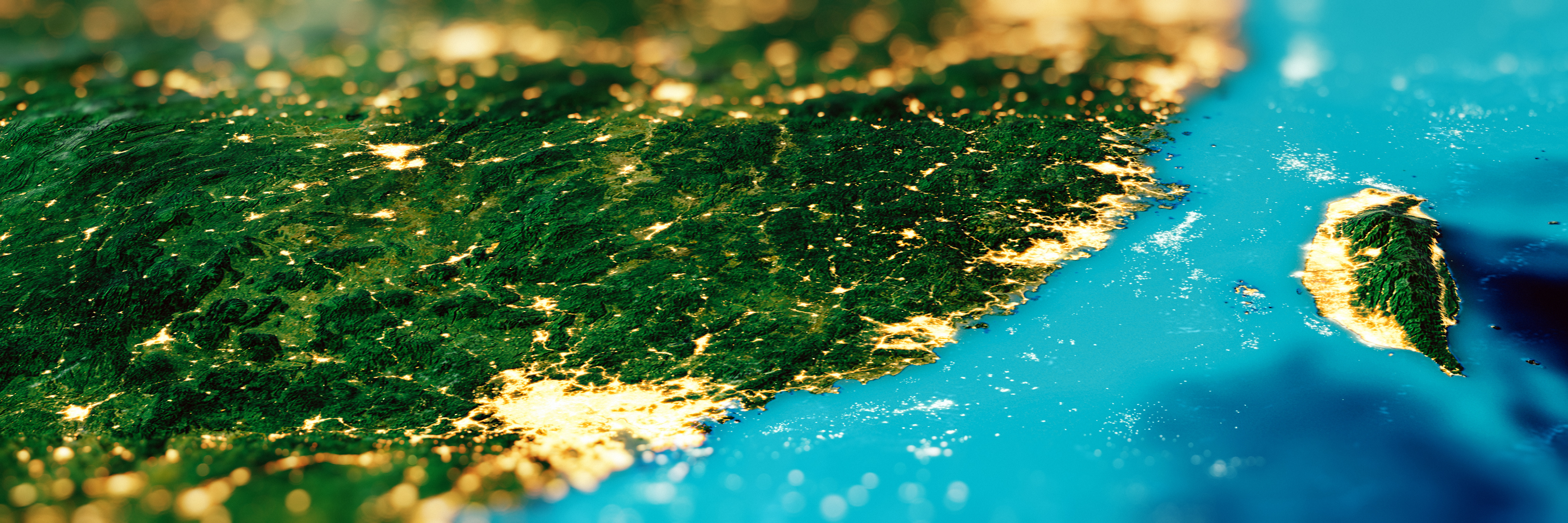
Navigating the dilemma of “prosperity versus self-reliance”
―― What is the history behind Taiwan’s current international position?
The situation surrounding Taiwan from the perspective of international relations is unique and unseen elsewhere: It does not maintain formal diplomatic relations with countries like Japan or the United States, yet it is a frequent destination among many tourists who can enter the island freely without a visa. This situation has a complex historical background.
Taiwan became a Japanese colony in 1895 as a result of Japan’s victory in the Sino-Japanese War (1894-95), but the country’s claims were renounced with its defeat in World War II. Subsequently, the Chinese Civil War broke out between the Chinese Nationalist Party, or the Kuomintang, and the Communist Party of China (CPC). The victorious CPC established the People’s Republic of China (hereafter, China) in 1949, while the defeated Kuomintang fled to Taiwan with approximately 1 million people, primarily those from the government, military and various bureaucratic agencies, and continued to claim legitimate rule over the Chinese mainland under the Republic of China banner. The CPC attempted to take Taiwan, but before it could do so, the Korean War broke out in 1950, which effectively paused the civil war.
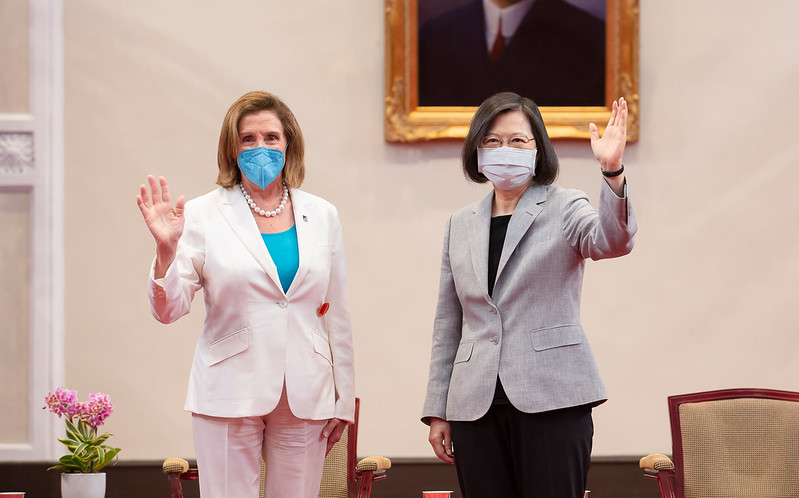
Photo credit: Office of the President of the Republic of China
Initially, many countries, including Japan and the United States, recognized the Republic of China diplomatically, but after the 1970s, formal diplomatic relations shifted from Taiwan to mainland China. Nevertheless, because Taiwan was in the Western camp during the Cold War, it benefited from U.S. protection like Japan and South Korea, allowing its economy to grow through exports to the U.S. market and technological assistance from U.S. companies.
This relationship inevitably was forced to change when the Cold War ended and the era of globalization began. The symbolic moment signifying this turning point was the entry of China and Taiwan into the World Trade Organization in 2001 and 2002, respectively. China, in particular, took on the role of the “world’s factory,” as barriers to trade and investment were lowered significantly and investment poured in from around the world.
Consequently, Taiwan now found itself in a difficult position. As Japanese, U.S. and European companies invested in China, Taiwan could not avoid doing the same without sacrificing its economic development and prosperity, simply because China was its so-called enemy. Therefore, Taiwanese companies also rapidly strengthened their trade and investment ties with China, but in doing so, created a situation in which Taiwan was economically dependent on its enemy, so to speak. Of course, China’s ultimate goal is unification with Taiwan, but as long as China is one of Taiwan’s largest trading and investment partners, Taiwan cannot distance itself from China, which means that it has no choice but to sacrifice its self-reliance. I refer to this situation as the “prosperity versus self-reliance dilemma.”
―― How has Taiwan navigated this dilemma so far?
Taiwan has been searching for a policy to deal with China, but in order to understand the background behind this, it is necessary to keep in mind that Taiwan has become a democracy.
In post-World War II Taiwan, the mainlanders (referred to as waishengren) who fled to Taiwan established an autocratic regime, which ruled over the indigenous Taiwanese people (benshengren), who lived through Japanese colonial rule. However, in the 1980s, the “third wave of democratization” (a term coined by American political scientist Samuel Huntington to refer to the surge in democratization movements that swept the world beginning in 1974) also reached Taiwan. As a result, the government was selected by democratic election, meaning that the voices of the majority, the benshengren, were now being heard in politics.
Many of those who lived under Japanese rule, and their descendants, have sought to restore Taiwan’s heritage, as much of the island’s culture was stamped out by the Kuomintang, which pushed to make it Chinese. As a result, a democratized Taiwan in the 21st century has seen a constant change of government, between those forces wishing to establish autonomy vis-a-vis China and others who believe they can maintain good relations with China and not ruling out the possibility of future unification. Which policy to adopt has been largely affected by not only international relations, but by domestic politics as well.
The administration of President Chen Shui-bian (2000-08) of the Democratic Progressive Party (DPP) focused on Taiwan’s self-reliance, but soon thereafter, the Ma Ying-jeou administration (2008-16) of the Kuomintang sought to improve the deteriorating relationship with China and did not rule out the possibility for eventual unification. However, the strength of China’s economic influence resulted in a backlash, leading to another change of government in 2016. The current DPP administration of President Tsai Ing-wen has adopted a policy of political self-reliance, while avoiding economic dependence solely on China and pursuing a policy of encompassing a plurality of economic partners.
Military tensions on the rise
―― What do you think is the reason behind military pressure from China?
Since the 2000s, China has been furiously building up its nuclear capabilities in order to both increase military pressure on Taiwan and to counter the United States. In response to China’s intense activity, as if the country were preparing for war, there has been increasing concern about an emergency situation unfolding in Taiwan. Several factors have contributed to this renewed increase in military tensions.
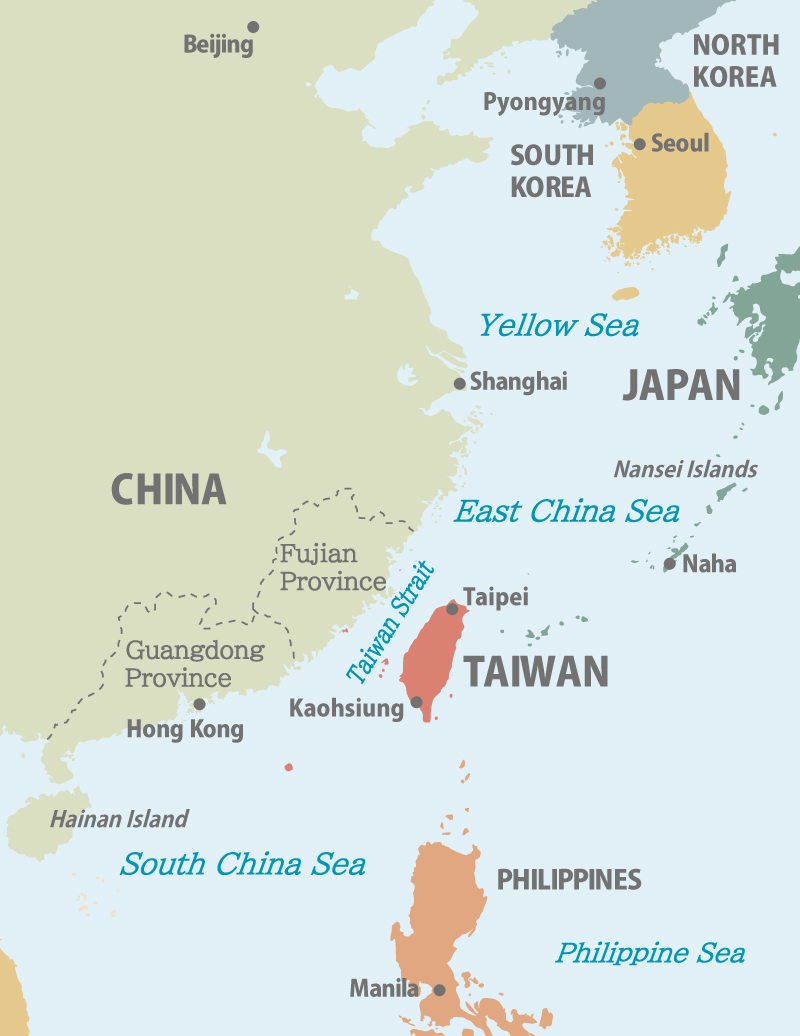
After World War II, China attempted to unify with Taiwan by all possible means. A major reason for the failure to take Taiwan originally in 1949 was the existence of the Taiwan Strait, as seas and rivers can be major obstacles when attempting to seize and occupy land. China then gave up on the idea of taking Taiwan by military struggle for the time being and shifted instead to diplomatic tactics, such as by pressuring other countries to choose a relationship with Beijing on the basis of the “one China” principle, thus isolating Taiwan. In doing so, China’s representation at the United Nations was changed in 1971 from the Republic of China (i.e., Taiwan) to the People’s Republic of China (i.e., mainland China), and Taiwan was expelled from related organizations.
However, because of the size of Taiwan’s economy, many countries maintained Taiwan as a trading partner, even in the absence of formal diplomatic relations. This led to the situation mentioned earlier in which China attempted to force Taiwan into an economically dependent position, though this did not work out as China had hoped when Taiwan’s democratization led to backlash and a change in leadership.
China has been unable to take Taiwan by either diplomatic or economic means, but in the meantime, China has grown to become the world’s second-largest economy and military power, leading to the current situation in which China is once again taking military measures. In response, the U.S. is demonstrating a defensive stance with regard to Taiwan, and China is unable to attack Taiwan militarily without disregarding both the U.S. and the U.S.-Japan security alliance. Nevertheless, China is embarking on a major military buildup so it has the capability to deter intervention by the U.S. military and Japan, even if it cannot eliminate them, which would force Taiwan to give up resistance.
―― How does Japan fit into this situation?
Japan would be unable to remain uninvolved if war breaks out in the Taiwan Strait.
If China launches missile attacks or air strikes on Taiwan from Fujian Province on its side of the Taiwan Strait, it would not be surprising for Japanese planes to wind up as collateral damage at any time. Taiwan and China laying sea mines would result in them flowing with the ocean current into waters around Japan, making it impossible for ships to navigate. When Chinese forces attempt to land in Taiwan, they would advance toward the island’s north from the direction of Shanghai, and south from the direction of Hainan Island. The troops would pass through the waters near Okinawa and the northern Philippines, which means that it would become a major war that encompasses not only the area around Taiwan, but also the East China and South China seas.
In the event that China attacks Taiwan, the U.S. military would take all possible steps, “as appropriate,” under the Taiwan Relations Act, ranging from diplomatic efforts to armed intervention. Not only have Taiwan and the U.S. always been close security partners, but Taiwan is also economically and technologically important to the U.S. as the home, for example, to some of the world’s largest and most advanced semiconductor companies. It is believed that the U.S. would prevent Taiwanese unification with China, even if the use of force becomes necessary.
Because deterrence against China is currently effective, we have not yet reached the point of a crisis involving other countries, but China is attempting to break down the status quo. Over the past two decades, China’s defense spending has increased dramatically; its defense spending and gross domestic product are now three to four times that of Japan. With increased military capabilities, one cannot rule out the possibility of China launching a previously unthinkable surprise attack on the U.S., similar to Japan’s attack on Pearl Harbor. And, if China attempts to strike U.S. forces in Japan right at the outset of the war, it is likely that the whole of Japan would be drawn into the conflict.
In contrast, Japan’s defense spending has long been heavily restricted, so Japan’s defense capabilities have been relatively weak, meaning an increase in defense spending would allow Japan to barely maintain the status quo. Japan has therefore shifted to increasing defense spending, developing counterattack capabilities, reinforcing deployment of the Self-Defense Forces in the Nansei Islands (including Okinawa) and strengthening the U.S.-Japan Alliance last year, but the purpose of these actions is rather to maintain deterrence against China and prevent war. If nothing is done, the current situation would be altered.
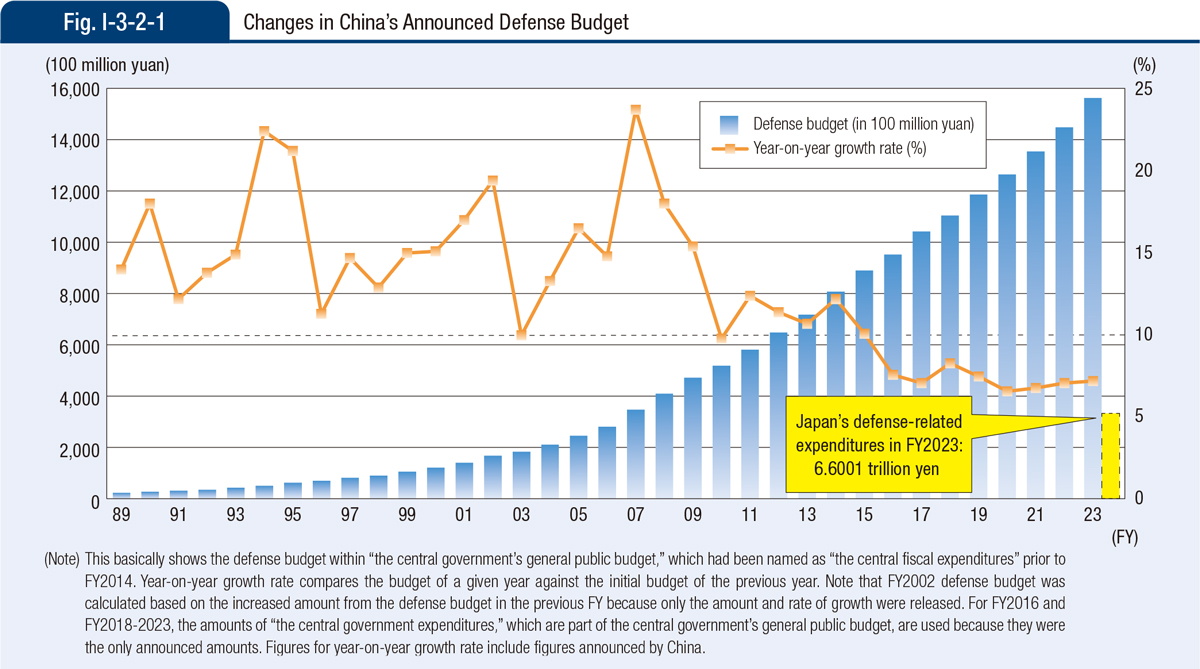
Protecting the international order
―― What effect is the ongoing war in Ukraine having on the situation in East Asia?
The Russo-Ukrainian War has demonstrated that wars between major nations are still possible in the 21st century; this was unthinkable a decade ago when nonstate terrorist organizations were considered a threat. In addition, China’s assertion that Taiwan is a part of China overlaps with Russia’s similar claim about Ukraine. Since assuming office, China’s President Xi Jinping has been calling for the “great rejuvenation of the Chinese nation,” for which unification of the “motherland” is a necessary condition. As he continues to expand China’s military and further his own personal dictatorship, the possibility of a situation unfolding similar to that in Ukraine is undeniable. As many have noted, “Ukraine today may be East Asia tomorrow.”
Ukraine and Taiwan are also different in many ways. A conflict with Taiwan would take place mainly in the sea and air, for example, rather than on land as in the case of Ukraine and Russia; an island separated by the sea can be attacked, but it is no easy feat to occupy. Another difference relates to Ukraine and Taiwan’s international statuses, as the former is a member of the United Nations as a sovereign nation, while the latter is not. Although the U.N. General Assembly adopted a resolution condemning Russia’s invasion of Ukraine, in the event of an emergency in Taiwan, non-U.N. frameworks, such as the G7, the EU, the U.S.-Japan Alliance or a coalition of the willing, would be the ones that would have to address the issue.
―― What should we focus on in East Asian affairs going forward?
It is no exaggeration to say that the situation in East Asia involving Taiwan is pivotal to maintaining the current international order.
As evidenced by the Russo-Ukrainian War, the U.S. has avoided engaging in combat directly with other nuclear powers. China’s possession of nuclear weapons would be the sole reason the U.S. does not engage militarily with China. However, if the U.S. does not become involved in a conflict if a party possesses nuclear weapons, nuclear-armed countries will have a free hand to do anything they please and more countries will try to obtain nuclear weapons, thus breaking the nuclear nonproliferation framework. In the event that the U.S. abandons Taiwan, many allies, including Japan, could start pursuing to develop their own nuclear arsenal. In other words, the loss of Taiwan would mean a collapse of the post-World War II international order.
In order to maintain the current order, in East Asian and Southeast Asian countries, there have been governments adopting a policy of cooperation with the U.S. and attempting to build a system to deter China. In the Philippines, the anti-U.S. administration of President Rodrigo Duterte has been replaced by that of Ferdinand Marcos Jr., which is more cooperative with the U.S., and President Yoon Suk Yeol’s administration in South Korea is also taking a stronger stance toward China.
This is the climate in which Taiwan is preparing for a presidential election in January 2024. The election will not only focus on the question of how to handle relations with China and the U.S., and national agendas such as strengthening defense capabilities, but also on domestic issues such as economic policy. Depending on the outcome, there could be another major shift in Taiwan’s policy concerning China. Given that the people of Taiwan are at the forefront of relations with China, it will be necessary to continue closely monitoring what choices they make.
Reference
Huntington, Samuel. (1991). The Third Wave: Democratization in the Late Twentieth Century. Norman, Oklahoma: University of Oklahoma Press.
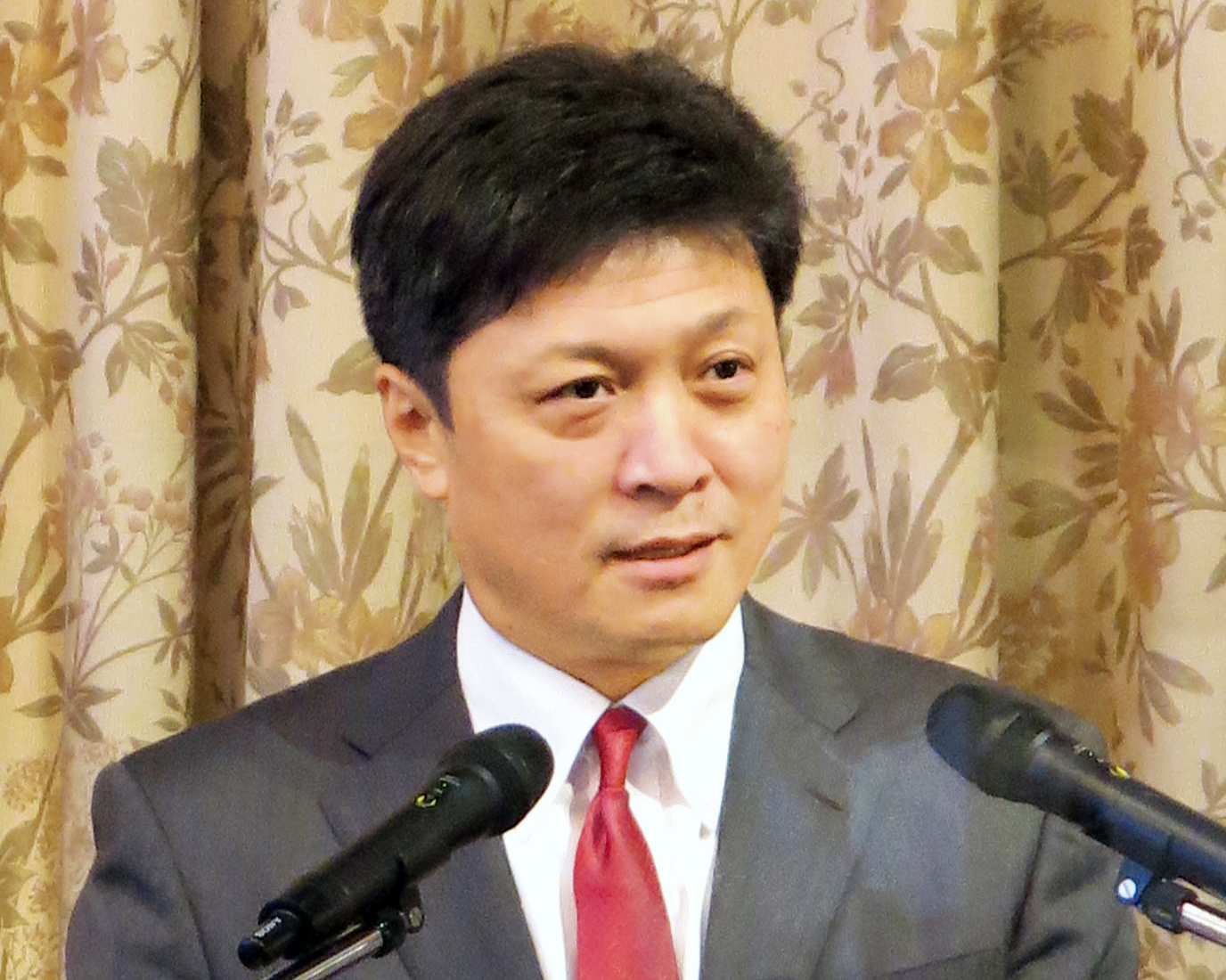
Yasuhiro Matsuda
Professor, Institute for Advanced Studies on Asia
Ph.D. in law from the Graduate School of Law at Keio University. Assumed current position in 2011 after spending time as a visiting research fellow at the Consulate-General of Japan in Hong Kong; 16 years as an assistant and senior research fellow at the National Institute for Defense Studies of Japan’s Defense Agency (later Ministry of Defense); and associate professor in the Institute for Advanced Studies on Asia at the University of Tokyo. Published numerous books and articles in Japanese, English and Chinese. Co-author of Nittai kankei shi: 1945-2020 (Zōhoban) (“A History of Japanese-Taiwanese Relations [Expanded Edition]”) (The University of Tokyo Press, 2020). Recent articles in English include: “The Taiwan Policy of the Xi Jinping Administration in its Second Term: An Outlook on Cross-Strait Relations in the ‘New Era,’” (online article) (Society of Security and Diplomatic Policy Studies, September 2018) and “Changes in the Dynamics of the Taiwan Strait due to Taiwan’s Success in Controlling the Novel Coronavirus” (Asia-Pacific Review, Vol. 27, Dec. 11, 2020).
Interview date: July 19th, 2023.
Interview: Yuki Terada






